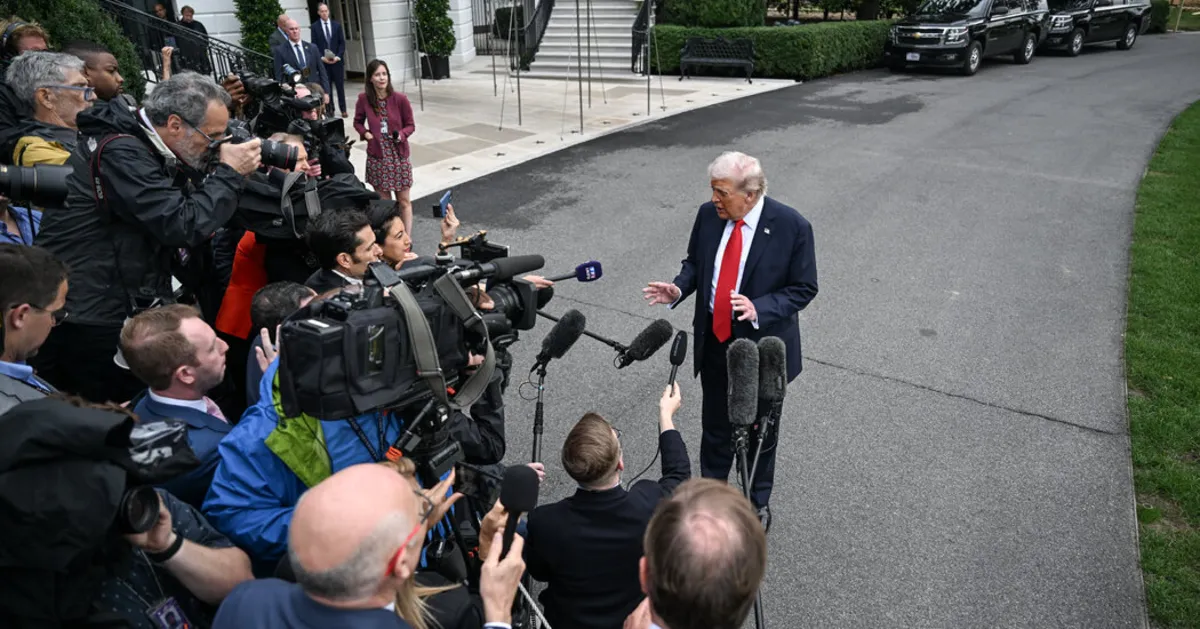
In a significant shift in political strategy, President Trump has intensified his longstanding efforts to suppress political opposition in the United States. This escalation follows the tragic assassination of right-wing activist Charlie Kirk, which Trump is using to bolster unfounded claims that Democratic organizations and protesters are part of a violent conspiracy against conservative values and the American way of life.
In the aftermath of Kirk's assassination in Utah, Trump and his top officials have vowed to launch a comprehensive attack on the political left. Their agenda includes targeting liberal groups such as George Soros’s Open Society Foundations and the Ford Foundation. They have proposed revoking visas for individuals perceived to be “celebrating” Kirk’s death, initiating federal investigations into hate speech, and designating certain groups as domestic terrorists. “We want everything to be fair; it hasn’t been fair, and the radical left has done tremendous damage to the country,” Trump stated to reporters, while continuing to minimize violence on the right. “But we’re fixing it.”
The individual accused of assassinating Kirk, a 22-year-old man, allegedly expressed his frustrations about Kirk's "hatred" in messages to his romantic partner prior to the murder. Trump's aggressive tactics against political opponents represent a continuation of his approach to consolidating power through lawsuits, executive orders, and public intimidation. This effort is aimed at punishing individuals and institutions that contribute to the political left or that Trump perceives as having wronged him.
In recent months, Trump's aides and conservative activists have been laying the groundwork for the kind of crackdown that now seems imminent. Scott Walter, president of the conservative watchdog group Capital Research Center, expressed his enthusiasm for the administration's plans to investigate the left-wing nonprofit sector and hold accountable those he believes contribute to political violence. Walter has briefed senior White House officials on various donors and nonprofit groups, further pushing the agenda of targeting liberal entities.
The plans that emerged following Kirk's death have stirred anxiety among Democrats and free speech advocates across the political spectrum. Right-wing figures are energized, viewing Democrats and the broader left as adversaries. Trump's aides are reportedly drafting an executive order aimed at combating political violence and hate speech, with potential release as soon as this week.
Some conservatives are apprehensive that targeting hate speech could backfire, especially if Democrats regain power. Walter warned that this could open “a Pandora’s box that we could all come to regret.” He contended that the administration would be more effective focusing on whether certain groups are violating tax code provisions instead of clamping down on free speech.
Attorney General Pam Bondi indicated that the administration would “absolutely target” protesters engaging in hate speech, as well as businesses that refused to print memorial posters for Kirk. Additionally, Vice President JD Vance urged citizens to report anyone celebrating Kirk’s assassination to their employers. The Trump administration is also preparing to dismantle what Vance describes as a network of nonprofit organizations that "foment, facilitate, and engage in violence."
Trump's proposals to target the tax-exempt status of nonprofits critical of his administration may face significant legal hurdles. The Internal Revenue Service (IRS) typically revokes tax-exempt status only after thorough audits, which can be time-consuming, and organizations have multiple opportunities to contest such decisions. Furthermore, federal law prohibits the president from instructing the IRS to audit specific organizations, and IRS employees could face serious penalties for complying with such directives.
While Trump has expressed a desire to classify certain groups as domestic terrorist organizations, law enforcement officials have indicated that there is currently no legal framework for designating domestic entities in this manner. Javed Ali, a former senior director at the National Security Council, noted, “Unless I missed a law or a statute, I don’t think there’s something on the books right now.”
Vance's accusations against Soros’s foundations and the Ford Foundation regarding their purported funding of The Nation magazine, criticized for its coverage of Kirk's death, lack substantial backing. The Ford Foundation clarified that its only recent donation was in 2019, which constituted a mere fraction of the magazine’s budget. Both foundations have publicly condemned political violence, asserting that their operations are entirely peaceful and lawful.
The actions and statements from the Trump administration mark a significant moment in the ongoing political discourse in the United States. As the nation grapples with the implications of these developments, the lines between political strategy, free speech, and the potential for violence continue to blur, raising serious concerns for the future of American democracy.